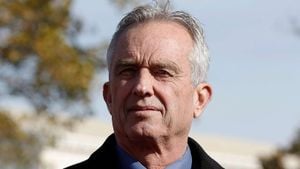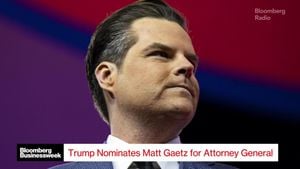With Donald Trump set to return to the White House for a second term, global confidence is steeped in uncertainty as the international community braces for potential shifts in U.S. foreign policy. Trump's initial presidency was marked by notable changes, including cuts to funding for various United Nations agencies and threats to withdraw from international agreements. Both past actions and Trump's rhetoric have sparked fears among global leaders about the direction his administration may take this time around.
Throughout his first term, Trump's stance on issues such as climate change and multilateralism significantly influenced the operations of global organizations like the United Nations. Environmental policies were sharply criticized when he famously withdrew the U.S. from the Paris Agreement, which aimed to combat global warming. With climate change being at the forefront of discussion among world leaders, many are left wondering if Trump will adopt similar positions moving forward. This uncertainty is particularly pressing as nations convene for upcoming climate negotiations.
Beyond environmental issues, Trump's administration grappled with complex global conflicts, offering limited support for multilateral interventions. These policies raised alarms about the U.S. commitment to its traditional allies and international law. Global organizations and foreign governments are now questioning how Trump's presidency might redefine their relationships. The fear of heightened tensions or unilateral U.S. actions, especially concerning military interventions, creates fraught dynamics among power brokers.
Economically, Trump's previous administration saw volatility, particularly within international markets. The return of Trump raises concerns among global investors, as many still vividly recall market reactions during his presidency, where unanticipated tariffs and trade restrictions created ripples across economies worldwide. The prospect of trade wars and heightened tariffs could undermine global trade dynamics yet again, stoking fears of a recession.
Much of the uncertainty also stems from Trump's handling of immigration policies, which were infamous for being aggressive and controversial. The international response to such measures created friction between the U.S. and various nations, particularly Mexico and Central American states. Should these policies re-emerge, immigration crises may exacerbate existing strains, leading to increased tensions and challenges for neighboring countries.
Domestic issues will also be under scrutiny as Trump’s presidency resumes; healing the internal divisions and polarization witnessed during his previous term will be no small task. With national unity at stake, both international observers and U.S. voters alike are questioning how he plans to address domestic grievances, especially considering the still-present fallout from the January 6 Capitol riots.
On the economic front, Trump’s policies, particularly those affecting taxation and regulation, are expected to shift investor confidence. Analysts foresee potential disruptions driven by anticipated changes to U.S. fiscal policy, which may lead to wider deficits and inflation. With the Eurozone facing its challenges, including shaky political stability, market analysts anticipate echoes of Trump’s economic impact could ripple across global bond markets.
Reports from financial analysts suggest fluctuated yields across the European bond market, driven largely by fears of U.S. policies under Trump. Investors are closely monitoring inflation rates and potential increases to U.S. tariffs; such movements could force central banks like the European Central Bank (ECB) to reevaluate their approaches to monetary policy. Kenneth Broux of Societe Generale warns, "Europe faces the challenge of balancing a weak economy with U.S. fiscal policies, which might threaten the stability of our recovery."
Countries within the European Union (EU) are poised to navigate new economic landscapes should Trump’s administration lean on unilateral trade policies instead of multilateral solutions like previous administrations. The potential for increased U.S. tariffs under Trump's administration presents significant challenges for European economies already trying to stabilize.
At home, Trump's win means reshuffling among his inner circle and addressing appointments of key administration roles, particularly those directly involved with foreign relations. Speculation mounts around appointments to agencies directly connected to international diplomacy, similar to the positions held during his previous terms. Analysts predict these changes could reverberate through existing diplomatic relationships.
China's approach to Trump’s return is another significant factor shaping the global outlook. Previous encounters between Trump and Chinese leadership revealed tensions, particularly concerning trade tariffs, human rights, and territorial disputes. Chinese policymakers are likely preparing for unpredictable negotiations, as they will have to grapple with U.S. policies reminiscent of Trump's first term.
With just weeks to go before the new administration takes power, the world watches closely. Trump's prior actions have already established patterns of unpredictability, fostering anxiety among allies and adversaries alike. The upcoming days will be pivotal as leaders conference over pressing issues like climate change, economic stability, and international cooperation, all under the looming shadow of Trump’s recently reignited presidency.
Supporters claim Trump will prioritize American prosperity above all else, reinstantiations for trade deals, and stronger negotiations with foreign partners and adversaries alike. Critics, conversely, express skepticism toward the administration's focus on unilateralism and its historical disregard for international consensus. Such tensions manifest globally as various nations align themselves with differing expectations of what Trump’s second term might entail.
The international community remains poised for both cooperation and contention as Donald Trump returns, leaving global players uncertain about how to navigate the challenges lying ahead. With stakes so high and dynamics so volatile, the world’s response to Trump poses fundamental questions about its stability and future engagement.



